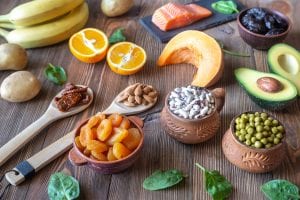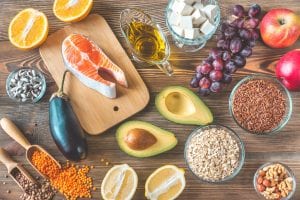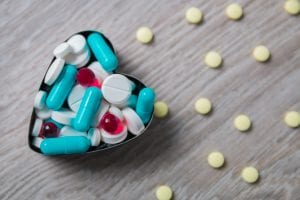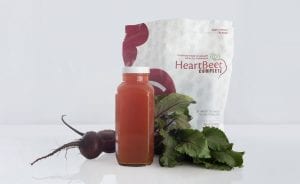Blood pressure
Blood pressure or B.P. is the force of blood against your artery walls. It measured in millimeters of mercury or mm Hg. You will hear or see two numbers, one over the other. The top number is systolic B.P.. This is your blood pressure when your heart beats. The bottom number is diastolic blood pressure, or your B.P. when your heart is at rest.
So, you know what the numbers are. But what do they mean?
- Normal: 120 or less / 80 or less
- Elevated: 120-129 / 80 or less
- High: 130 or higher / 90 or higher
- Hypertensive crisis: 180 / 120 or higher
High Blood Pressure Risks

High blood pressure can lead to
- Weakened and narrowed blood vessels in kidneys
- Thickened, narrowed or torn blood vessels in eyes
- Metabolic syndrome
- Cognitive decline (troubles with memory or dementia)
- Heart Failure
- Heart Attack
- Stroke
- Aneurysm
Learn more about risks here.
High Blood Pressure Factors
These factors and conditions lead to high blood pressure.
- Risk of high B.P. increases as you age.
- Family history. If a parent or close relative has high blood pressure, it increases your risk.
- Men are more prone to high blood pressure until about 65; after menopause, women are at higher risk for high blood pressure.
- Blood pressure tends to be higher among people of African heritage.
- High blood sugar can damage blood vessel walls.
- Extra weight means your heart must pump more fluid to your body, increasing blood pressure.
- Smoking or tobacco us. This can damage your artery walls all raise your blood pressure.
- Excessive Drinking. Too much alcohol can damage your heart over time.
- Too much salt. Salt makes your body retain fluid, which increases blood pressure.
- High cholesterol. Cholesterol builds up in your arteries, making them narrow.
- Lack of physical activity. A sedentary lifestyle increases your heart rate, making your heart work harder. It also increases your chance of being overweight.
- Conditions like sleep apnea and kidney disease can also increase your risk.
How to Lower Blood Pressure
Monitor These
Blood pressure
The first thing you need to keep an eye on is your blood pressure. This is mainly because high B.P. doesn’t have many outward symptoms. You may not even know you have it! You can get your blood pressure checked with your doctor or learn to do it at home. And as you work on other ways to lower your B.P., you can monitor your progress.
Cholesterol
 It is important to monitor your cholesterol because high cholesterol adds to the plaque that builds up in your blood vessels. Your arteries can become narrow, hardened, and clogged. This can lead to high blood pressure, heart disease, heart attack, and stroke. Cholesterol can be checked at your doctor’s office. We’ll talk more about how to lower cholesterol when we talk about diet.
It is important to monitor your cholesterol because high cholesterol adds to the plaque that builds up in your blood vessels. Your arteries can become narrow, hardened, and clogged. This can lead to high blood pressure, heart disease, heart attack, and stroke. Cholesterol can be checked at your doctor’s office. We’ll talk more about how to lower cholesterol when we talk about diet.
Weight and BMI
Maintaining a healthy weight is important for blood pressure. Excess weight can put stress on your heart, which must beat harder to pump blood through your body. An imbalanced BMI (body mass index) may also indicate other complications such as an unhealthy diet. You can calculate your BMI using your height and weight.
Blood Sugar
Having both high blood pressure and high blood sugar increases your risk of heart problems. According to Blood Pressure UK, about 25% of people with Type 1 diabetes and around 80% of those with Type 2 have high B.P.. High blood sugar levels can also damage blood vessel walls. If you have diabetes, work with your doctor to manage both your blood sugar and your B.P.. Your doctor may recommend a blood pressure medication.
Eat a Healthy Diet
Eat less of these
One thing to cut down on is salt. Salt naturally raises blood pressure by making your body retain more fluid. The more fluid in your body, the higher your blood pressure.
Eating less red or processed meat can also help lower your blood pressure. Red meat and processed meats can be loaded with cholesterol and fats, which contributes to the plaque buildup in your blood vessels.
Eat more of these
Your B.P. and heart health are dependent upon a healthy diet. First, make sure to get plenty of fruits, vegetables, and whole grains.
Certain diets are made to help you lower your blood pressure, like the DASH diet (which stands for Dietary Approaches to Stop Hypertension). The Mediterranean diet is also helpful for some people. Try to find foods that you enjoy to not make eating a chore. Find what works for you and stick with it.
Minerals you need

Healthy Foods That Are High in Potassium
Make sure that you are getting the recommended daily intake of potassium, calcium and magnesium.
Potassium helps balance the amount of salt in your blood, which helps your body balance fluid and maintain a normal B.P.. You can find potassium in white beans, potatoes, sweet potatoes, bananas, and tomato sauce. The recommended daily amount is 3,400 mg for adult males and 2,600 for adult females. (If you have kidney disease or are taking blood pressure medication, talk with your doctor about your daily potassium intake.)
Magnesium is an important mineral for keeping your blood vessels relaxed and open and for regulating blood sugar levels. You can find magnesium in dark, leafy greens, unrefined grains, avocados, and legumes. The recommended daily intake is 400 – 420 mg for adult men and 310 – 320 mg for adult women.
Calcium helps regulate when your blood vessels need to constrict and widen, as well as fortifying your bones and properly releasing hormones and enzymes. Eating dairy products, leafy greens, legumes, and fish will help you get the calcium you need.
You don’t need to go overboard on taking supplements for these minerals unless you have a deficiency. Getting the recommended daily intake from food should be enough.
Manage your cholesterol

Foods that provide a low cholesterol diet
To lower your cholesterol, avoid trans and saturated fats. These are found in foods that are deep-fried and processed. Foods like potato chips and packaged pastries should be avoided. If it says “hydrogenated” or “partially hydrogenated” on the label, it is probably a good idea not to buy it.
Other fats are healthier. These are mainly found in foods like avocados, nuts, beans, seeds, fatty fish (like salmon), and vegetable oils. These also contain other beneficial nutrients that will improve your overall health.
Cultivate Healthy Habits
Exercise
Getting regular physical activity is one of the best things you can do for your blood pressure. Exercise increases nitric oxide in your blood, which sends a signal to your blood vessel walls to relax and expand. This naturally lowers your B.P.. Plus, there are other benefits like improving your mood and overall well-being. Doctors recommend 30 minutes a day, five days a week for maximum benefit.
Do not smoke or use tobacco

Smoking is harmful for many reasons, but it also affects your blood pressure and heart health. The nicotine in cigarettes raises your B.P., and the tobacco increases the plaque in your blood vessels. If you do smoke, find a way to quit. (You can start here to learn how.) If you do not smoke or use tobacco, don’t start.
Limit alcohol and caffeine
Excess amounts of alcohol can cause your blood pressure to spike and cause weight gain. Drink should be limited to two glasses per day for men and one for women.
Caffeine can also increase B.P. for some people. Limiting your caffeine intake will help you regulate your blood pressure. (If you regularly get caffeine from soda, it will also help you manage your sugar intake and weight.)
Manage Stress
A little stress doesn’t hurt, but chronic stress and anxiety can. One way they hurt is by raising blood pressure. If you have constant stress or anxiety, find ways to relax. This can include setting aside time for activities you enjoy, meditation, or yoga. It’s also important to get enough sleep, exercise, and eat healthy foods. If needed, you may also seek medical or professional help. Doing this will be good for your heart, and your life.
Think About These Supplements
Beetroot Powder 
Beets are known for containing dietary nitrates, which become nitric oxide gas when you eat them. Why would you want that? When nitric oxide enters your blood, your blood vessels expand (just like they do when you exercise). Beetroot powder, like Heartbeet Complete, is a supplement that is easily mixed with water—a simple way to get your daily nitrates.
L-arginine
L-arginine is also converted to nitric oxide in your body. It has the same ability to dilate your blood vessels and help lower your B.P.. And it can easily be taken as a supplement. L-arginine Plus by Elements of Healthcare can be a great place to start.
L-citrulline
This amino acid becomes l-arginine in your body, which then continues the process of widening the blood vessels. Heartbeet Complete and L-arginine Plus also contain l-citrulline.
Omega-3 Fatty Acids
Did you know that omega-3s can also help with your blood pressure? They mainly do this by lowering triglyceride levels. Triglycerides are unused calories stored as fat in your blood. High triglyceride levels can clog up your arteries. Supplements such as Omega-3 Fish Oil or Krill Oil naturally lower triglyceride levels and improve blood flow.
Talk with Your Doctor About Medication

Say you have tried lifestyle changes and taken natural supplements and your B.P. is still high. What then? You can talk with your doctor about a B.P. medication.
Again, this is best left as a last resort. Making lifestyle changes will benefit more than just your heart but improve your quality of life. Plus, some medications may come with unwanted side effects.
Common blood pressure medications
- Diuretics help your kidneys remove salt from your body. Remember, high salt content makes your body retain fluid, which increases B.P.. Diuretics reverse that process.
- Beta-blockers decrease your heart rate.
- Angiotensin-converting enzyme inhibitors (ACE inhibitors) help your blood vessels relax, which improves blood flow and lowers blood pressure.
- Angiotensin II receptor blockers (ARBs) work like an ACE inhibitor.
- Calcium channel blockers stop calcium from entering cells, which relaxes the blood vessels.
Side effects of blood pressure medications can include
- Cough
- Constipation
- Diarrhea
- Dizziness / lightheadedness
- Erectile dysfunction
- Nervousness
- Fatigue, tiredness, or weakness
- Headache
- Nausea
- Vomiting
- Skin rash
- Weight loss or gain
The Bottom Line
If you have high blood pressure, you can lower it. Though some physical traits and conditions can increase your risk, healthy lifestyle choices can decrease that risk. A healthy diet, exercise, not smoking, and managing stress are great places to start. You can also consider heart-healthy supplements like Heartbeet Complete or L-arginine Plus or (after everything else) talk with your doctor about B.P. medication. Make a change today for your heart!


